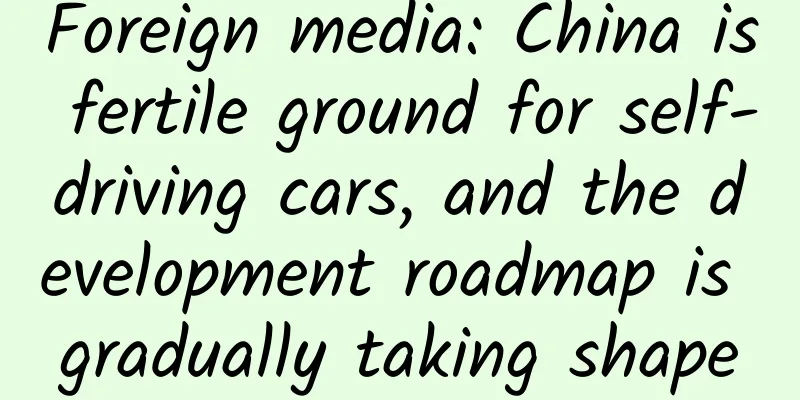Foreign media: China is fertile ground for self-driving cars, and the development roadmap is gradually taking shape

|
According to the technology blog VentureBeat, the United States and Europe have always been the leaders in the research and development of self-driving cars. However, as a world power, China is also catching up. They will achieve overtaking through policy regulation. In the future, China will even surpass technological powers such as Europe and the United States in the popularity of self-driving cars. Premier Li Keqiang said that China is drafting a roadmap for self-driving cars, striving to enable self-driving cars to have the ability to drive on highways within 3-5 years, and by 2025, self-driving cars will enter cities. Automotive engineers test driverless cars The roadmap was drafted by automotive engineering experts from Tsinghua University, while the Ministry of Industry and Information Technology is the strong backer of the plan. The roadmap also covers relevant technical standards for self-driving cars, including a common language used by vehicles to "communicate," and related infrastructure construction and management regulations. At this point, China has a unified framework for self-driving cars. In contrast, the United States does not have a unified standard, but only a hodgepodge of state laws and technical standards. Strickland, former safety director of the National Highway Traffic Safety Administration, believes that this will seriously hinder the development of self-driving cars in the United States. Fertile Ground for Self-Driving Cars China's top-down model has actually promoted the development of self-driving cars. Automakers have standards to follow and only need to focus on developing technology. In addition, self-driving cars are in line with the future development direction of China's economy (high-tech industry), so the government has also invested huge resources in this field. "If we can have unified standards in this area, China's self-driving cars will hopefully lead the world," said Li Yusheng, head of Chongqing Changan Automobile's autonomous driving department. China has very suitable soil for the growth of self-driving cars. First, China has grown into the world's largest automobile market. Second, China has serious air pollution problems. Self-driving cars can reduce traffic congestion and fuel waste, and reduce exhaust pollution. Finally, data from the World Health Organization shows that more than 200,000 people die in car accidents in China each year, and self-driving cars can greatly reduce the occurrence of traffic accidents. In addition, China's automobile industry has a short history of development, and users generally have little accumulation of automobile culture, so they have little feeling for the so-called driving passion. At the 2015 World Economic Forum, the organizer conducted a small survey, and the result showed that 75% of Chinese people said they were willing to use self-driving cars, while in the United States, this proportion was only about 50%. The Boston Consulting Group said that in the next 20 years, China will become the largest market for self-driving cars and consume a quarter of the world's self-driving vehicles. Ambitions The draft roadmap will be submitted to various departments for review and revision in the future, and finally submitted to the State Council for approval. Industry experts believe that the government will at least legally recognize the status of self-driving cars and set minimum standards for their various functions. However, China is not so conservative, and its ambitions for self-driving cars are still big. In the future, China may use existing cellular data technology to connect vehicles to the Internet, so that vehicle communications will be faster and more stable, while the United States and Europe use the dedicated short-range communication standard (DSRC). "The United States, Europe and Japan have spent a lot of effort on the research and development of DSRC systems, so they very much hope that China will adopt them, but since we are just starting, why not adopt more advanced communication technologies such as LTE and 5G?" said Professor Li, who is responsible for drafting the roadmap. In addition, the timeline of China's roadmap closely follows that of the world's mainstream car manufacturers. According to reports, Toyota will launch a self-driving car that can operate on highways in 2020, and Mercedes-Benz will also launch a self-driving car around 2020 after 20 years of research and development of self-driving technology. According to the roadmap plan, Changan and SAIC will also launch their own self-driving cars in 3-5 years. Self-driving tour In order to get ahead in this field, China has launched a number of combined measures. Professor Li, who is responsible for drafting the roadmap, said they are now looking to resolve a series of legal issues surrounding autonomous driving, such as who is responsible after a car accident. Li Shufu, chairman of Geely Automobile, believes that China should amend relevant laws. He believes that automakers should be responsible for accidents in autonomous driving mode. "If we cannot keep up with the times in relevant laws, it will be difficult for autonomous vehicles to sell well in China," said Li Shufu. "Although government support can accelerate the development of China's auto industry to a certain extent, there is still a lot for manufacturers to do in terms of technology research and development and safety testing," said IHS analyst Carlson. Before the Beijing Auto Show, Changan Automobile also organized a massive expedition, in which its self-driving cars traveled 2,000 kilometers from its headquarters in Chongqing to Beijing. There were test engineers in the self-driving cars, but they would not touch the steering wheel unless it was an emergency. During the 2,000-kilometer journey, the vehicles reached an average speed of 80 kilometers per hour, and they would adjust their speed according to road signs and traffic lights. Li Yusheng of Changan Automobile said that the company's self-driving models will be officially launched in the market within 2-3 years, and they will invest 5 billion yuan in research and development in this field before 2020. In addition, Changan Automobile is actively contacting Baidu to discuss cooperation between the two companies in this field. Professor Wang from Beijing Normal University said: "In the future, the strong cooperation between technology companies and automakers will become a new highlight of the industry." As a winner of Toutiao's Qingyun Plan and Baijiahao's Bai+ Plan, the 2019 Baidu Digital Author of the Year, the Baijiahao's Most Popular Author in the Technology Field, the 2019 Sogou Technology and Culture Author, and the 2021 Baijiahao Quarterly Influential Creator, he has won many awards, including the 2013 Sohu Best Industry Media Person, the 2015 China New Media Entrepreneurship Competition Beijing Third Place, the 2015 Guangmang Experience Award, the 2015 China New Media Entrepreneurship Competition Finals Third Place, and the 2018 Baidu Dynamic Annual Powerful Celebrity. |
Recommend
Why is the ranking not improving even though the price is so high? A good SEM search promotion account structure is very important!
Baidu search keyword bidding is a very common pro...
Retired due to "dementia"! What is this disease that "steals" memory?
Recently, a shocking news came from the film indu...
The brightest gamma-ray burst ever detected! Exploring the most powerful explosion in the universe
Recently, my country's Insight-HXMT satellite...
Growing flowers and vegetables reduces the risk of cancer; always feeling depressed and anxious? Do some good deeds | Hot spot review
"Hotspot Review | Major Technology Events of...
Can't resist the "sweet temptation"? Why not give it to "red, orange and green"?
This is the 4582nd article of Da Yi Xiao Hu News ...
What kind of weird fruit is this? I didn’t expect that the core can be eaten!
It is the heaviest fruit in the world. Although i...
Anniversary event planning: 5 steps from planning to implementation!
The growth of a person needs the blessing of birt...
Apple removes 256 iOS apps from its App Store. Is your app affected?
According to foreign media Ars Technica, Apple re...
Some are happy, some are worried. The reason why the radio and television industry is making another move may be because TVOS2.0 is coming.
Recently, a ban issued by the State Administratio...
Huanxin Sui Yunyi: A complete analysis of Huanxin ONE SDK architecture
HuanXin Instant Messaging SDK has been in use for...
These 19th-century green books are beautiful but poisonous
Image source: PhilaAthenaeum via Youtube The book...
What should Sharp learn from Japanese rice cooker and toilet seat companies?
Following the bad news of heavy debt, selling bui...
There is a reason why firefighters ask you to lose weight! Because you are over 140 pounds...
In fire rescue, Firefighters will adopt different...
Nature's GPS: How do animals use the natural world to navigate?
Millions of animals around the world follow the s...
The most common knee-damaging exercise for modern people is actually sitting!
Audit expert: Wang Linyu Deputy Chief Physician, ...









